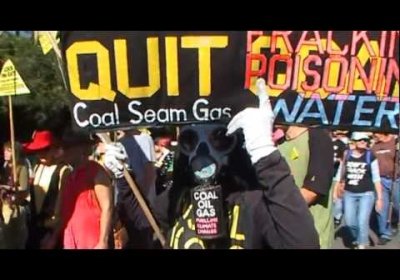The Wilderness Society released the statement below on May 15.
* * *
Rallies will be held around the country tomorrow (Wednesday, May 16) to protest the outrageous use of police resources to crush community opposition to the proposed James Price Point gas industrial complex in Western Australia’s Kimberley.
Australia
Melbourne, May 12. Photos by Ali Bakhtiavandi
Melbourne, May 12. Photos by Ali Bakhtiavandi
CSG Free Northern Rivers brought 7,000 people to the streets of Lismore on May 12 in a colourful and outspoken show of solidarity against Coal Seam Gas Mining in the region. And concerns over coal mining loom not far behind in a groundswell push to renewable energy sources.
The Wilderness Society released the statement below on May 14.
* * *
• 250 police sent to Broome; 276 to Eureka Stockade.
• Joint venture partners must speak out or be tainted by Premier’s actions.
Western Australian Premier Colin Barnett has sent 250 police officers to Broome to crush community opposition to the proposed gas industrial complex at James Price Point, not far off the 276 police and soldiers sent to the Eureka Stockade to crush the miners.
After protests against across-the-board staff cuts at the Australian National University (ANU) in Canberra, a new major "restructuring" has been proposed for the School of Music.
The university has two music programs. It announced one would be cut while the other would undergo significant changes, focused on "professional development" and the "portfolio career" rather than the fostering of musical abilities.
The University of Sydney Vice-Chancellor Michael Spence and the university Senate further displayed their “democratic” views on May 7 by sending riot police to break up protests by more than 500 students and staff.
Protesters disagreed with the flawed plan to carry out budget cuts and retrench staff.
Spence also sent an email to all staff damning the protesters as “outside agitators”, even though the protest was organised by the student-led Education Action Group (EAG) and the National Tertiary Education Union (NTEU).
In a display of non-partisanship, Marrickville Council put the community first by voting unanimously to lock the gate on coal seam gas (CSG) mining on May 8.
Local stop coal seam gas activists urged councillors to prohibit a private waste disposal and recycling company — Alexandria Landfill — from being allowed to sub-contract its site in St Peters to a CSG miner for exploration and pilot drilling.
Over only a few days, more than 1000 families from 60 Australian cities and towns volunteered to host asylum seekers awaiting a protection visa, under a government scheme to release more refugees from detention.
From next month, the Australian Homestay Network, the Red Cross and the federal government will coordinate to place asylum seekers released from detention on bridging visas in Australian households for a six-week stay.
Online campaigner GetUp! made a call-out to its members on May 3 and the Homestay network wrote to its 5000-member base asking for help.
Is there a surplus or is there not? Does delivering a $1.5 billion surplus in 2012-13 make Wayne Swan a “good economic manager”? Are you a winner and grinner or a loser soon to be driven to the boozer? Blah, blah, blah. Enough, enough already with the budget spins and counterspins.
You want something real to worry about from the budget? Worry about your job if you are lucky enough to still have one, and worry about what will happen to you if you lose it.
"We are all Greeks" was the proud solidarity message worn by many at the Sydney May Day march on May 6. This simple message captured the widespread solidarity felt with the working people of Greece — including the unemployed, pensioners, students and small business owners — who are being forced to pay a painful price to bail out the biggest banks in the world.
Supporters of the National Campaign for the Right To Strike initiated the sign-on statement below.
* * *
Australian law has never provided for the unrestricted right to strike. The first Australian industrial law, the Commonwealth Conciliation and Arbitration Act of 1904, penalised Australian striking workers with fines and jail sentences.
Before that, Australian workers had to comply with the British Master and Servants Act of 1837, which meant that a worker could face jail if they were absent from work for an hour without permission.
- Previous page
- Page 744
- Next page






